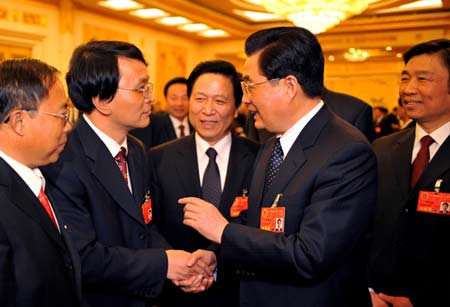Chinese President Hu Jintao said on Wednesday that the nation must draw lessons from this year's severe winter weather crisis and be on guard against similar risks.

Chinese President Hu Jintao stresses on Wednesday that the nation must draw lessons from this year's severe winter weather crisis and be on guard against similar risks while joining the discussion of Jiangsu deputies.
The deep freeze and snow chaos that hit eastern, central and southern China starting in mid January rang an alarm, said Hu while joining his fellow deputies to the National People's Congress (NPC) -- the country's top legislature -- from the eastern Jiangsu Province.
"The more advanced our society and economy, the more we have to be prepared for and be on guard against such risks," he told the national legislators.
To be prepared for danger in times of safety would help China withstand trials, overcome hardships and record new victories in building a moderately prosperous society, said Hu, who is also general secretary of the Central Committee of the Communist Party of China (CPC).
The president said he "fully agreed" to Premier Wen Jiabao's report delivered on Wednesday morning to nearly 3,000 legislators and more than 2,000 political advisors at the opening meeting of the NPC annual session.
While deliberating Wen's report together with the Jiangsu deputies, Hu stressed China should earnestly put into practice the Scientific Outlook on Development, promote a conservation culture and boost a sound and rapid development for the economy.
"We must concentrate on economic construction and pursue development whole-heartedly. At the same time, we must ensure a comprehensive, balanced and sustainable development," he said.
The Scientific Outlook on Development has been a new doctrine of the CPC that stresses sustainable economic growth and harmony between man and the nature. It was inscribed in the CPC Constitution at the 17th National Congress of the CPC that ended on Oct. 21, 2007.
China has achieved outstanding progress in economic development since 1978 when the country initiated the policy of reform and opening up, but at the cost of environment, energy and resources.
Some major pollution incidents have left bitter memories for Chinese, such as chemical pollution of the Songhua River in northeast China in November 2005 after a chemical plant explosion and the blue-green algae outbreak in the Taihu Lake in Wuxi, Jiangsu last May. Both incidents caused days of water cuts for millions of residents.
"We must build a resource-efficient and environment-friendly society, and further promote the awareness of conservation among the general public," Hu said.
The president also underscored the significance of the reform and opening up for the past three decades, saying that China could not have scored huge economic achievements, greatly improved people's livelihood and increased the overall national strength without implementation of the policy.
"Today, if we want to resolve the deep-seated problems that constrain China's social and economic development, if we want to realize scientific development, we must unswervingly continue to reform and open up," Hu said.
Other top Chinese leaders including Wu Bangguo, Jia Qinglin, Li Changchun and Xi Jinping also joined deliberations of NPC delegations from Anhui, Beijing, Sichuan and Shanghai respectively on Wednesday.
(Xinhua News Agency March 6, 2008)